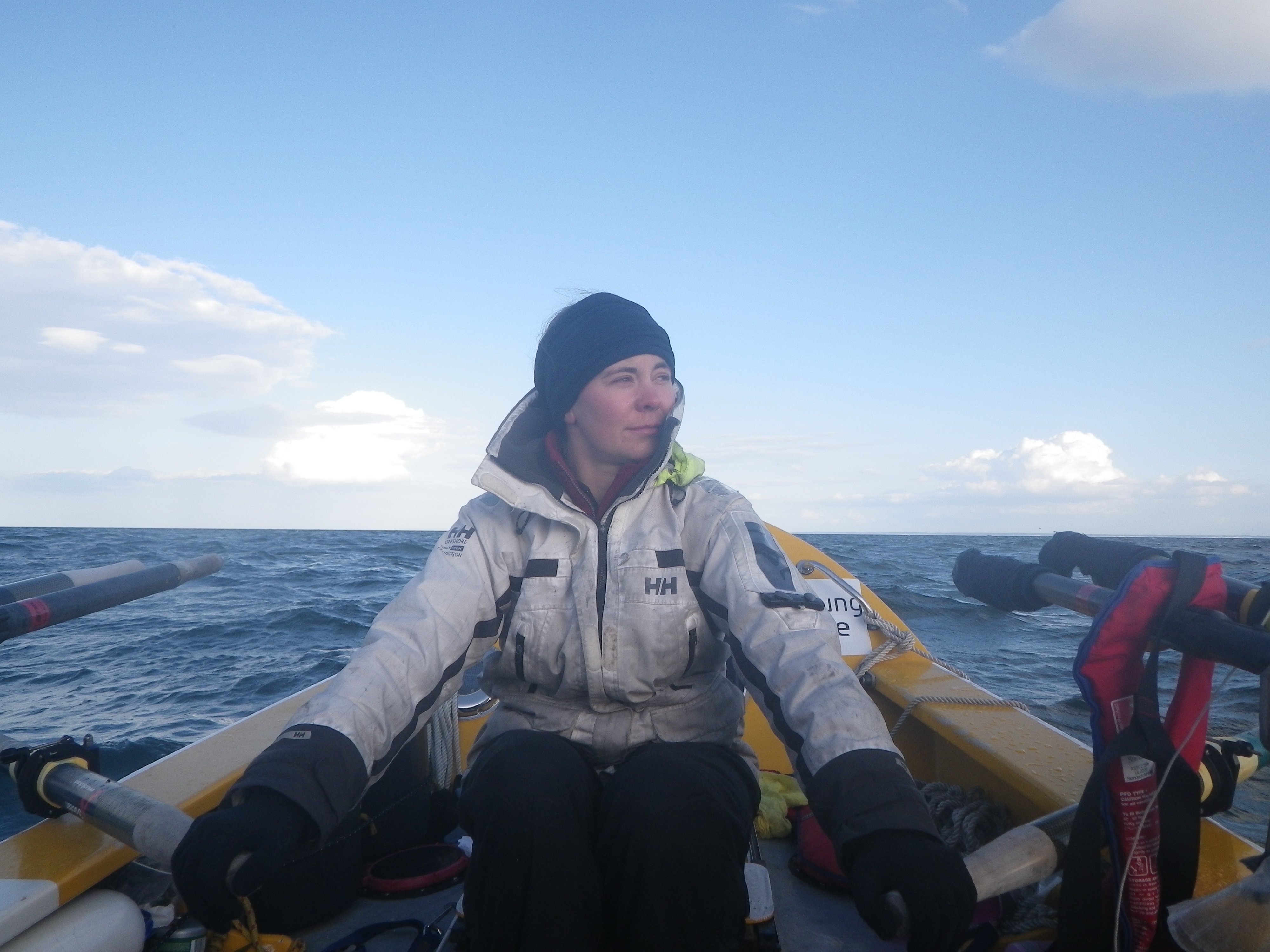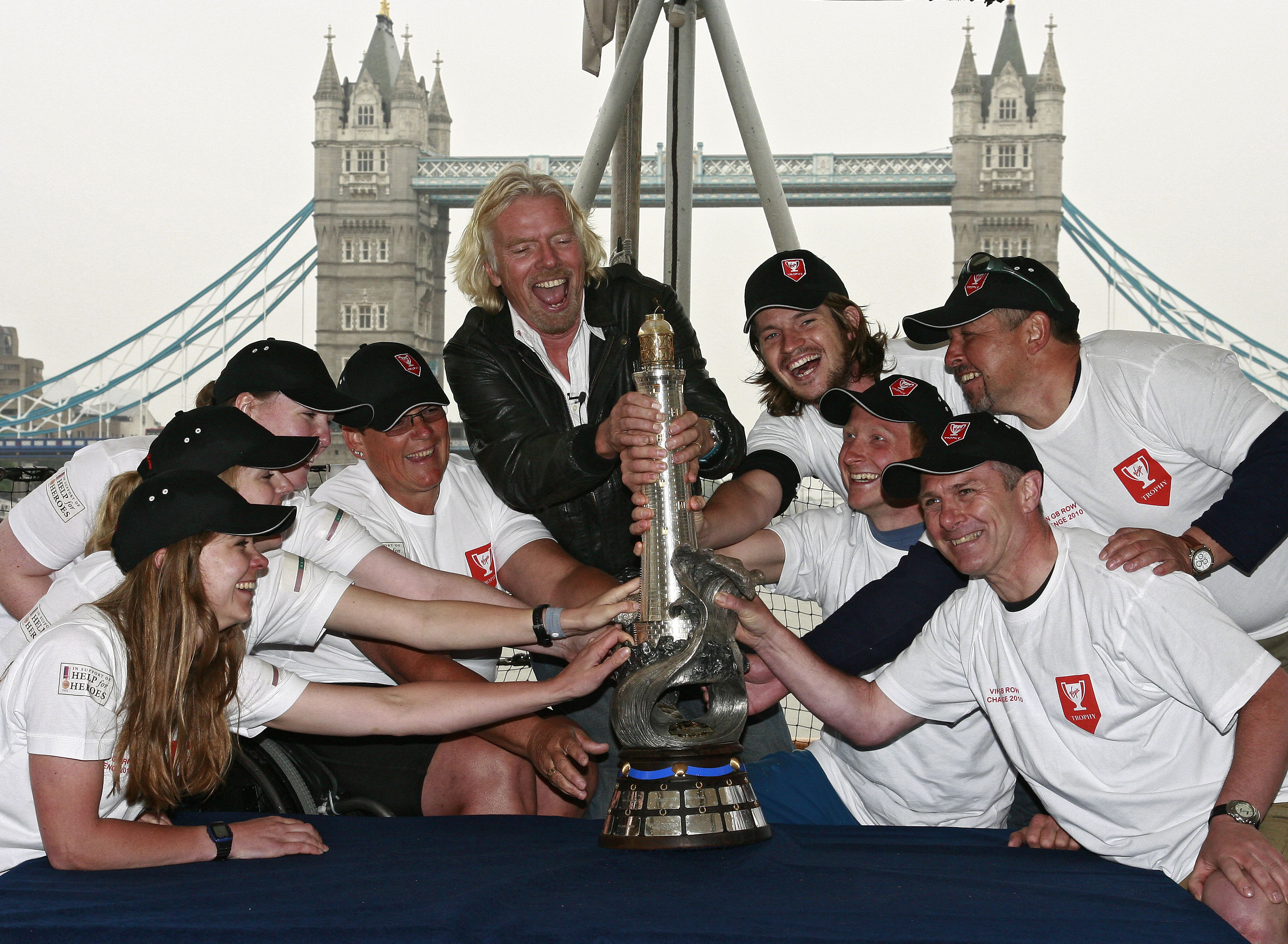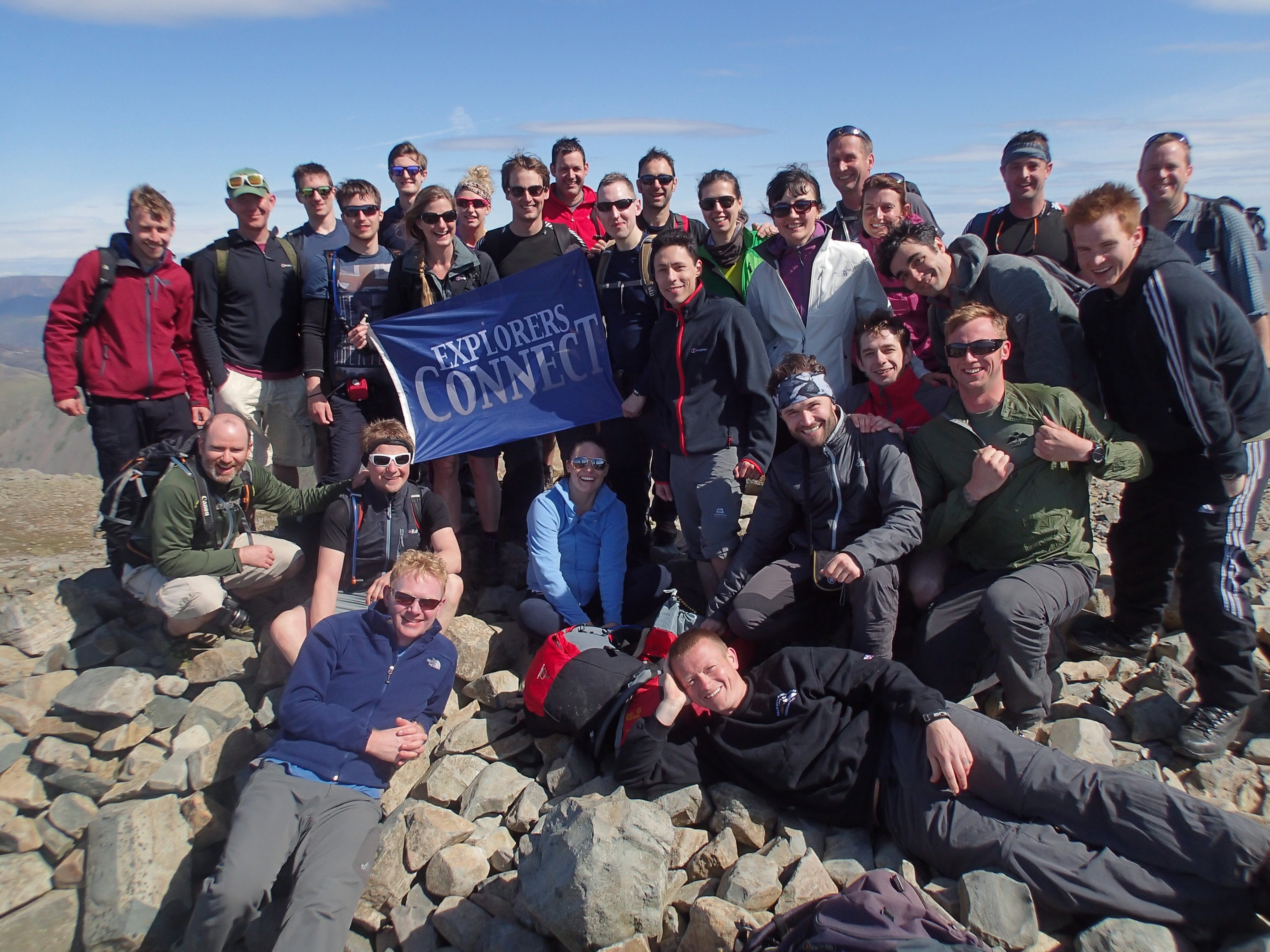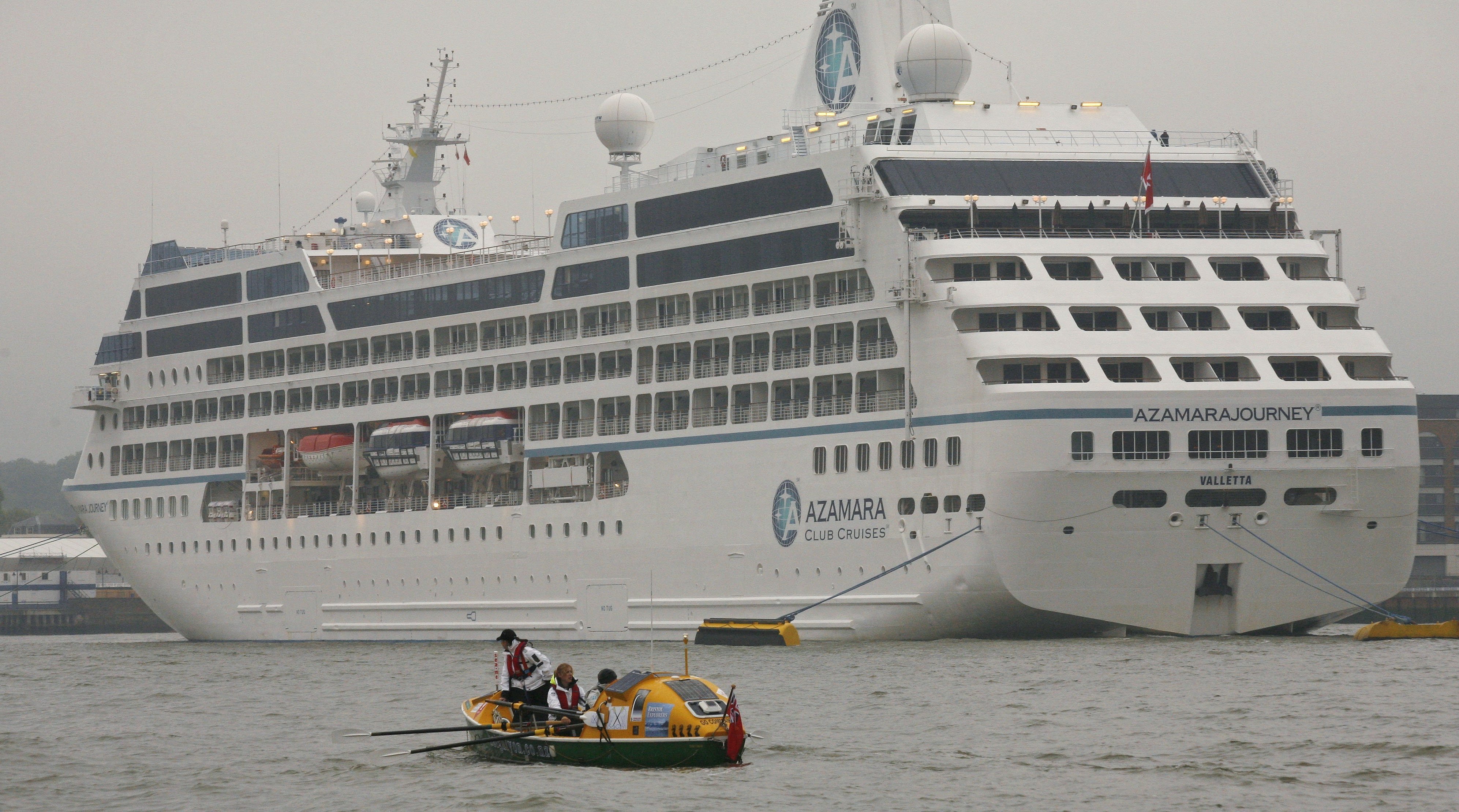
Today we chat to an amazing woman who’s on a quest to get people to live more adventurously…

Belinda Kirk has walked across Nicaragua, searched for camels in China’s Taklamakan desert, the so-called Desert of Death, discovered rock paintings in Lesotho and was skipper of the first female crew to row non-stop around Britain, in a punishing 2,101-mile, 51-day voyage.

 Sir Richard Branson posing with the the SeGals (all-female team) and The Misfits (all-male team) grabbing the Virgin Trophy, 2010. Both teams set off from Tower Bridge in London to row non-stop, around the treacherous waters of mainland Great Britain to raise money for Help For Heroes and win the Virgin Trophy and up to £45,000 in prizes. Image credit: onEdition
Sir Richard Branson posing with the the SeGals (all-female team) and The Misfits (all-male team) grabbing the Virgin Trophy, 2010. Both teams set off from Tower Bridge in London to row non-stop, around the treacherous waters of mainland Great Britain to raise money for Help For Heroes and win the Virgin Trophy and up to £45,000 in prizes. Image credit: onEdition
An expert expedition leader, she has managed remote trips for outdoor survival gurus such as Ray Mears and Bear Grylls. In 2009, her passion for adventure inspired her to launch Explorers Connect, a social enterprise which connects people to adventures, team-mates and adventure industry jobs. She’s now establishing Britain’s first national day of adventure encourage everyone to spend more time in the great outdoors while raising money for the Youth Adventure Trust, a charity which uses outdoor adventure to help vulnerable and disadvantaged young people develop the hope, skills and confidence to face the challenges in their daily lives.
1. How are you doing what you love?
I am on a mission to help people have more adventures. Western society has become incredibly disconnected from nature and challenge and I believe that the more we embrace these things, the better society we will be – and the more fun we’ll all have too.
I’ve spent 20 years taking groups into the wilderness and I’ve seen it change people’s lives again and again. So eight years ago I set up Explorers Connect as a free hub for people to find and help each other have adventures. Initially it was to inspire others to go on at least one expedition or ‘big adventure’ in their life but now it’s also about helping others to have more local easily accessible adventures as often as possible. After all, once you’ve got a taste for nature and adventure, or you’re re-introduced to it, you just want more. It’s the most natural thing in the world!
 Explorers Connect Bushcraft Course, 2015
Explorers Connect Bushcraft Course, 2015
We also run adventure weekends, holidays and courses, open to all abilities, where you can come on your own or with your friends. We make it easy for people to reconnect with the outdoors, gain outdoors skills and meet likeminded people.
2. What are you working on right now?
The thing I’m most excited about at the moment is that we, as a community at Explorers Connect, are setting up Britain’s first national day of adventure to inspire everyone to get outdoors. It takes place on July 16 and it’s called Wild Night Out. The aim is to raise money for a charity that helps disadvantaged kids and encourage them to discover their spirit of adventure and connect with nature. It’s easy to get involved, whether you camp in your garden with the kids or climb a mountain with some mates, the idea is to have fun and do something meaningful to give back.

3. Tell us about your childhood; when did you first realise that you were ‘an adventurer’?
I grew up on Alderney, the most northerly of the Channel Islands, and was so wild I was labelled ‘feral’. What a great start for any kid! I would ride my bike all day to explore every corner of the island, build dens, have secret gardens, climb trees, catch fish, etc. To have such freedom as a child was a blessing and is probably the reason I’m so passionate about helping kids – and everyone else – get outdoors now.
Think back to your own childhood… if you are 30+ chances are most of your happiest childhood memories will involve being outdoors, that says something doesn’t it? But what about today’s kids? What will their happiest memories be? As a society I think we have a duty to help make adventure, the outdoors, and being in nature more accessible for them.
4. What was your first big adventure and why does it mean so much to you?
My grandfather was a zoologist in Africa for many years so his tales of African adventures when I was a kid inspired me to go to Africa on my own, aged 18. Before that I’d been on a couple of family holidays in Europe. I was green. A year’s travelling solo changed my life. It was tough yet effortless, and terrifying yet joyful. I experienced many emotions at same time and ultimately I knew that this was what ‘living’ was all about. It’s not always easy, but it’s always worth it. I came back a changed person knowing that whatever I did, travel, and having adventures, was an essential part of my life.
5. What have been your highlights since then?
I’ve been lucky enough to have at least one ‘big’ adventure every year since I was 18. It’s only in the last four years that I’ve been spending more time doing small regular adventures in the UK with friends and the community at Explorers Connect.
 Three Peaks Challenge with Explorers Connect, 2014
Three Peaks Challenge with Explorers Connect, 2014
Once you hit 30 I think you start to realise that the impact you have and the legacy that you leave that is way more important than any ‘gongs’ or world records. So, without doubt, the adventures I look back on with most pride are the ones that have made a difference.
Like when I was in Africa, studying colobus monkeys in Tanzania and then travelling around alone afterwards. The youth development expeditions take young people out into remote areas – mostly jungles and deserts – for up to 12 weeks at a time. I’d see these youngsters transform as they gained confidence, skills and a different view of the world. I saw it change them like it changed me. I’m still in touch with many of them, some now adults with their own kids.
 Filming for the BBC in Kenya, 2010
Filming for the BBC in Kenya, 2010
My favourite filming expedition was definitely the first series of Beyond Boundaries for the BBC. We filmed a group of people with disabilities crossing Nicaragua. It was spectacular on so many levels. For me personally it was life affirming to understand that people are people no matter what they look like, what their background is or, in this case particularly, what disability they happen to have. Everyone was pushed to their limits and everyone excelled in their own area.
I’ll never forget a guy called Karl who told me that loosing his leg after a near-death experience was one of the best things that ever happened to him. He said it was a wake up call, a turning point, after which he quit the job he hated and found the courage to start living the life he’d always imagined. Best of all, when the series aired, we had bags of letters and tons of emails from viewers with disabilities who felt inspired to achieve more than they ever though possible.
And that’s really one of the ways in which I think adventurous challenge is so transformative. If you’ve never climbed a mountain, walked across a continent or learnt a new skill, but then you do it, you gain a new perspective. You realise that you have been putting ceilings on your dreams and that actually, anything is possible.
6. What have been your biggest, and smallest expeditions to date?
My biggest was leading an expedition of over 100 people into the Amazon – all working in smaller groups spread throughout the national park. I was 25 and the youngest Chief Leader they’d had. We were working with the university in Iquitos doing various scientific studies. The responsibility was quite terrifying but I broke it down into manageable chunks, took one day at a time, and with the help of a great team, made it happen.
Over the last few years I’ve done loads of fabulous small expeditions in the UK. I’m loving discovering my own country, having spent my entire career looking for adventure overseas. One of my favourite adventures was on an Explorers Connect trip where we swam with blue sharks off Cornwall two summers ago. Then, by complete chance 10 pilot whales (yes, whales in Cornwall!) came to swim with us too – it was utterly magical.
7. You’ve managed remote trips for the likes of Bear Grylls and Ray Mears. Where were these and what was involved?
I worked in adventure TV for 14 years. I literally started as a runner making tea, and then quickly got into the logistics of taking film crews safely into remote areas. I did this on three series’ of Ray Mears shows (in Kenya, Alaska, Europe, Tanzania, Canada) and two series of Bear Grylls shows (in Alaska, Moab, The Rockies, and The Alps).
 Exploring slot canyons in Utah, 2008
Exploring slot canyons in Utah, 2008
8. In 2012 you received a Guinness World Record for rowing an epic 2,500 miles around Britain. What were the best parts, and the toughest, about that 52-day challenge?
The best parts were the wildlife and the views. Britain has so much more gorgeous coastline than I’d ever realized and the wildlife – wow! Hundreds of dolphins escorted us in South Wales, orcas visited us in Scotland, basking sharks in Cornwall, loads of seals skulked behind our boat in countless places around the coast and on top of all that we had skuas, puffins, gulliemots and more landing on the boat or swooping close overhead. Because we were such a small boat with a quite engine, wildlife were happy to come over and investigate.
 Dodging ships! The Seagals leaving Tower Bridge in London for an epic adventure. Credit: onEdition.
Dodging ships! The Seagals leaving Tower Bridge in London for an epic adventure. Credit: onEdition.
The worst bit was realising that not only were we crossing some of the busiest shipping lanes in the world but that ships couldn’t see us because we were so small. We had equipment on board to make us look bigger on radar but looking back I don’t think it really worked. We relied on nothing but human power to get ourselves out of near collisions on more than one occasion. We literally had to force big cruise liners and tankers to change course by shouting down the radio to them. They didn’t always believe we were invisible to them, hidden in the swell. Twice we were nearly run-down and that would have been game over. It was very sobering because however efficient we got at contacting boats in our area, we knew that it was never going to be totally in our control.
 Arriving at The Thames. Credit: onEdition
Arriving at The Thames. Credit: onEdition
 Exhilarated and exhausted: reaching the finish line with my Seagals. Credit: onEdition
Exhilarated and exhausted: reaching the finish line with my Seagals. Credit: onEdition
9. How do you come up with ideas for unique adventures – and what kind of pressure is there to do something completely new?
I’ve always been an ideas person, I have way too many ideas, or at least I act on way too many of them all at the same time. I’m over optimistic about what I can actually get done in a 24 hour day, and in 365 days a year. The problem is not coming up with ideas its actually knowing when to say no or when to wait until the right time – you can’t do everything. I’m learning to pick the stuff I most believe in.
I don’t think that you should ever do an expedition to get sponsorship. You should do it for yourself or for your team, and for the joy of doing it. I always recommend people do adventures cheaply, so there’s no need for sponsors. It’s amazing how much you can save if you put your mind to it and how cheaply you can do a big adventure. In my experience, the single biggest reason why big expeditions fail is lack of money so they never get to the start line. My top top tip is: Do it cheap, make it happen yourself.
10. The world really is your office. Can you describe a day in your life at the moment?
Since I started Explorers Connect I actually sat behind a desk way more than I ever have before! When you run your own business there’s so much paperwork! But I believe in what I’m doing and that’s a massive incentive and motivator. Knowing that I’m making a difference in the world is what gets me up in the morning.
Every day is different but on an average week I spend around four days a week planning adventures (meetings and in front of the computer) and three days actually having adventures. I can’t complain but ultimately I’d like it to be the other way round.
 River Great Ouse journey with Explorers Connect, 2016
River Great Ouse journey with Explorers Connect, 2016
11. Why is adventure a good thing? What benefits does it bring? And why could we all benefit from having a little more adventure in our every day life?
I could write a book on why adventure is good for you because there are SO many reasons why, so I’ll try to keep it brief….
Most of all, adventure is good for your mental, physical and emotional health. There is a huge amount of anecdotal and scientific evidence to prove that it makes you happier, fitter, less stressed and even nicer (seriously, one of my favourite scientific studies is one that shows that the more time you spend in a natural environment the more generous you become).
The bit I’m particularly interested in is how adventure reconnects you with nature and offers you real personal challenge – two things that are seriously lacking for most of us in our urban risk-averse lives. If you take up challenges, even if you fail, you are a changed person, a better person with more skills, confidence and a bigger taste for life and experiences. And nature, wow we all need to spend more time hugging trees and walking barefoot in the grass. And its not just life experience that tells me this, there’s decades of science to back this all up. Instinctively we all know that spending time outdoors is ‘good for us’. You come back feeling refreshed, less anxious, happier as you’ve gotten back to the basics and have had time away from the busy stressful modern world.
A big reason for setting up Wild Night Out is because our kids are getting the brunt of these social changes. It’s a sad fact that the proportion of children in the UK regularly playing in wild places has fallen from over half to under 1 in 10 since the mid 70s. We want to change that.
 Returning from 11 months in Africa on my own, aged 19
Returning from 11 months in Africa on my own, aged 19
13. What’s next for you? And what’s your ultimate dream?
My ultimate dream is to make Wild Night Out as big as Red Nose Day, to help inspire more people and families get outdoors more often. I want to find a big organisation to help me, I’m not precious I just want to see it happen. So if you’re reading this and think it’s a good idea, get in touch, as a team of people who care, lets make it bigger every year. The simplest way is by doing something outdoors on 16 July (from going on a hike, camping in your garden or learning a new outdoor skill) and getting your mates to join you – oh, and don’t forget to share your photos with us at #wildnightout and donate what you can for the kids charity.
14. Finally, a quote/saying you live by…
Spend your days doing what you believe in and be BRAVE. You rarely regret what you do, even if things don’t turn out the way you planned. There’s nothing worse than looking back and wondering ‘what if…?’
You can find out more about Belinda here. For more information about Explorers Connect click here or connect via Facebook and Twitter. And for more information about Wild Night Out including how to join an event or make a donation, visit the Wild Night Out website. You can also connect via Facebook and twitter.



